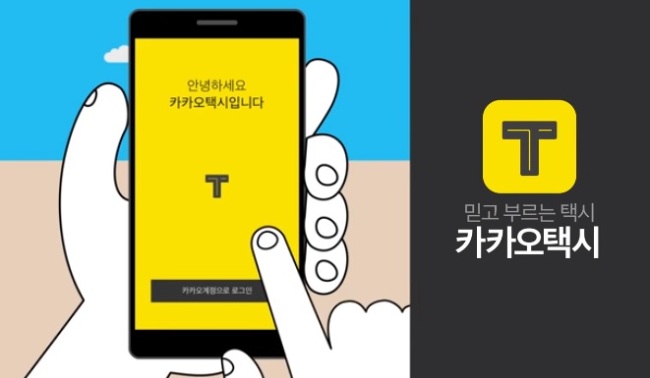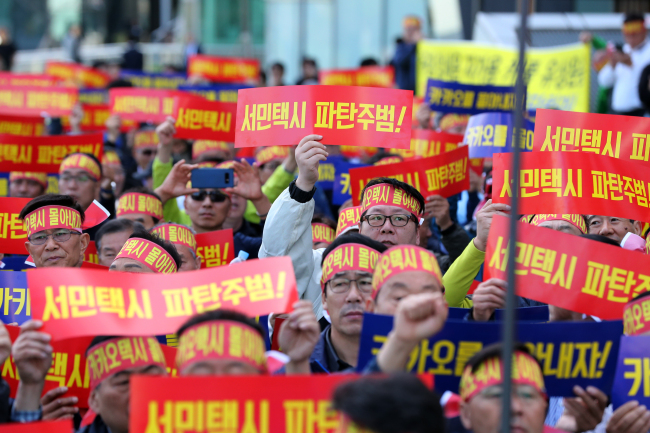[News Focus] Kakao’s carpooling service plans ignite backlash from taxi drivers
Korea’s homegrown smart mobility services weighed down by regulations, market backlash
By Sohn Ji-youngPublished : Oct. 8, 2018 - 15:09
In South Korea, it is fairly easy to fetch a taxi in the daytime. You can flag down an empty cab on the side of the road, or summon a taxi to your current location via the Kakao Taxi mobile app on a smartphone.
However, the situation changes drastically at certain times of the day, including the morning and evening rush hour as well as late at night. Gangnam and Hongdae are notorious areas in Seoul where catching a cab after midnight seems almost impossible, with demand outweighing the supply of taxis that seemingly become pickier in selecting customers.
According to Kakao, the problem is linked to a shortage of available taxis during those selected time frames. Taxi drivers also prefer long-distance rides over short-distance rides, as the former bring in higher fares.
However, the situation changes drastically at certain times of the day, including the morning and evening rush hour as well as late at night. Gangnam and Hongdae are notorious areas in Seoul where catching a cab after midnight seems almost impossible, with demand outweighing the supply of taxis that seemingly become pickier in selecting customers.
According to Kakao, the problem is linked to a shortage of available taxis during those selected time frames. Taxi drivers also prefer long-distance rides over short-distance rides, as the former bring in higher fares.

As one potential solution to this chronic supply-demand imbalance, Kakao Mobility, which operates the Kakao Taxi service within the Kakao T mobile app, is preparing to launch by the year’s end an alternative ride option in the form of carpooling using personalized vehicles.
However, Kakao’s plans to launch the carpooling service -- expected to be offered at slightly cheaper rates than regular taxi fare -- has sparked fierce protest from local taxi drivers who claim the service will take a major toll on their business and steal their jobs.
Last week, a group of four taxi unions staged a protest in front of Kakao Mobility’s headquarters in Pangyo, Gyeonggi Province, and threatened to boycott all ride requests placed via Kakao Taxi if the firm decides to officially release the carpooling service.
The group of taxi unions are slated to stage similar protests against Kakao in Pangyo on Thursday and Oct 18.
Kakao Mobility’s plans to introduce a carpooling service has been in the works since February, when the mobile messaging giant acquired Korean app Luxi, a ride-hailing platform that connects drivers -- of regular, non-taxi vehicles -- with riders.
It is similar to foreign ride-hailing apps like Uber’s UberX, but in Korea the service works with operational limits. Korea’s transport law does not permit the commercial operation of personal vehicles, but makes an exception for a small window of “commute hours,” conventionally interpreted as between 5 a.m. to 11 a.m. and 5 p.m. and 2 a.m. on weekdays.
Leveraging this regulatory window, a number of Korean startups have launched carpooling apps.
Keeping in line with the operational restrictions, Kakao had planned to merge Luxi’s service into Kakao T by the year’s end, on grounds it could improve ride availability during peak commute hours when there are not enough taxis to meet demand.

But the official entry of a major IT company like Kakao into the carpooling business -- as opposed to a handful of small startups in the space -- appears to have ignited a fresh sense of anxiety among taxi drivers, who remain vehemently opposed to the introduction of alternative ride options.
A Kakao spokesperson said the company “believes the envisioned carpooling service will greatly alleviate the inconvenience riders suffer due to a supply-demand imbalance in taxis in the morning and late-night hours.”
“It will not steal away jobs from taxi drivers, but rather work as a supplement to the taxi business,” he said, adding that the company will continue to converse with the taxi industry and related government agencies to resolve differences on the carpooling issue.
This is not the first time that Korea has experienced controversy over the adoption of new modes of commercial transport, such as carpooling. Critics have warned that Korea’s rigid regulatory stance against new technologies is killing off the smart mobility industry that is quickly growing in size in markets elsewhere.
For instance, Poolus, a Korean carpooling startup that had rivaled Luxi, effectively went out of business in June as a result of growing financial difficulties and regulatory hurdles when the firm tried to expand the scope of its business.
Poolus had sought to introduce a new option in which a driver could freely select two four-hour slots out of the day’s 24 hours, allowing eight hours of carpooling trips per day on weekdays and weekends.
The startup had launched the option on grounds that “commuting hours” can be interpreted more broadly to reflect flexible work hours and diverse lifestyle patterns outside of the traditional 9 a.m. to 6 p.m. work schedule.
But the Seoul Metropolitan Government launched a police investigation into Poolus for breaching the transport law, scaring both drivers and riders. The government’s plan to host a discussion on the issue with industry stakeholders was canceled before it could even begin, due to taxi drivers physically blocking the event’s venue.
In August, yet another mobility startup faced threats of a shutdown. Modoo Shuttle, a startup that operates commuter buses for people in areas where public transportation systems are underdeveloped, was suddenly investigated by Seoul City.
Under the circumstances, the Korea Startup Forum, a startup business union, recently issued a public statement calling on the government to “stop criminalizing startups” and to ease regulations that are strangling the startup ecosystem and new innovations.
“We are not asking for unilateral deregulation, but regulatory innovation. If the government continues to strain new platforms that can coexist with incumbent businesses, it will discredit its stated vision to achieve innovative growth,” said the statement.
By Sohn Ji-young (jys@heraldcorp.com)







![[Graphic News] More Koreans say they plan long-distance trips this year](http://res.heraldm.com/phpwas/restmb_idxmake.php?idx=644&simg=/content/image/2024/04/17/20240417050828_0.gif&u=)
![[KH Explains] Hyundai's full hybrid edge to pay off amid slow transition to pure EVs](http://res.heraldm.com/phpwas/restmb_idxmake.php?idx=644&simg=/content/image/2024/04/18/20240418050645_0.jpg&u=20240419100350)





![[From the Scene] Monks, Buddhists hail return of remains of Buddhas](http://res.heraldm.com/phpwas/restmb_idxmake.php?idx=652&simg=/content/image/2024/04/19/20240419050617_0.jpg&u=20240419175937)

![[KH Explains] Hyundai's full hybrid edge to pay off amid slow transition to pure EVs](http://res.heraldm.com/phpwas/restmb_idxmake.php?idx=652&simg=/content/image/2024/04/18/20240418050645_0.jpg&u=20240419100350)

![[Today’s K-pop] Illit drops debut single remix](http://res.heraldm.com/phpwas/restmb_idxmake.php?idx=642&simg=/content/image/2024/04/19/20240419050612_0.jpg&u=)